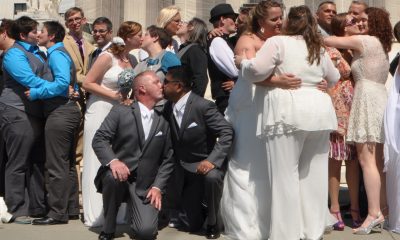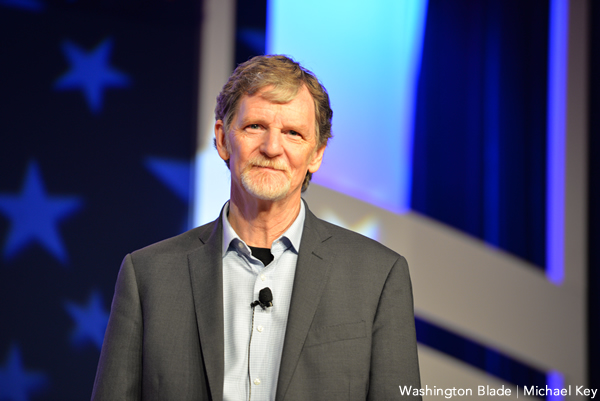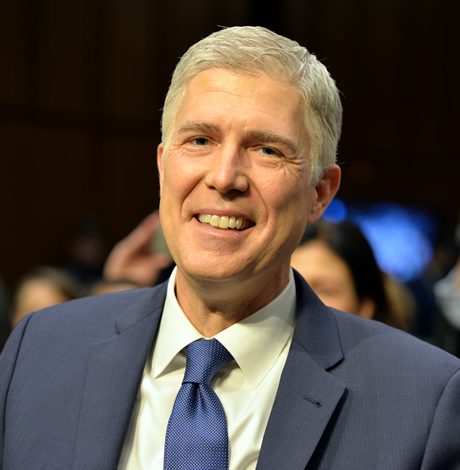News
DOJ touts anti-LGBT views, task force at ‘religious freedom’ summit
Sessions accused of ‘undermining LGBTQ rights’
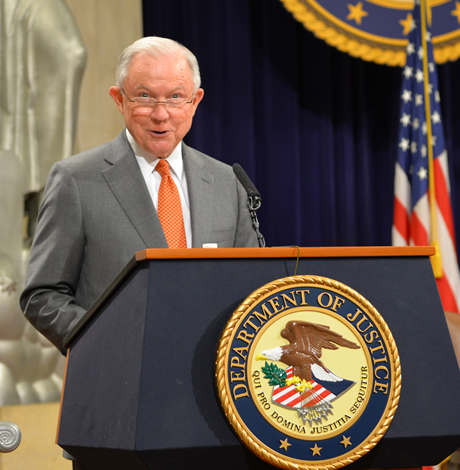
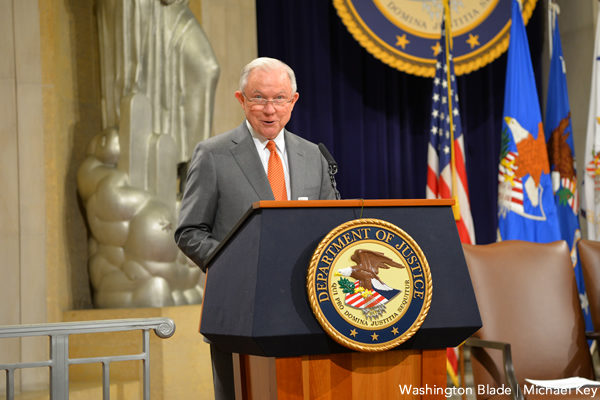
Attorney General Jeff Sessions announced the creation of a Religious Liberty Task Force. (Washington Blade photo by Michael Key)
A summit at the U.S. Justice Department on Monday ostensibly intended to promote religious freedom, including the creation of a Religious Liberty Task Force, often highlighted efforts to enable anti-LGBT discrimination.
At the summit in the Justice Department’s Great Hall, U.S. Attorney General Jeff Sessions announced the creation of the task force to implement “religious freedom” guidance he issued last year.
“The task force will help the department fully implement our religious liberty guidance by ensuring that all Justice Department components — and we got a lot of components around the country — are upholding that guidance in the cases they bring and defend, the arguments they make in court, the policies and regulations they adopt and how we conduct our operations,” Sessions said.
According to the Justice Department, Sessions will serve as chair of the task force, which will be co-chaired by Acting Associate Attorney General Jesse Panuccio and Associate Attorney General for the Office of Legal Policy Beth Williams.
Sessions said a primary mission of the Religious Liberty Task Force will be ensuring Justice Department employees “know their duty is to accommodate people of faith.”
“This administration is animated by the same American view that has led us for 242 years that every American has a right to believe and worship and exercise their faith in the public square,” Sessions added.
The underlying guidance on which the task force is based seeks to allow individuals and businesses to act in the name of religious freedom — often used as an exercise for anti-LGBT discrimination — without fear of government reprisal. Nowhere in the guidance is there a limiting principle assuring the right to free exercise of religion should be an excuse to engage in anti-LGBT discrimination.
Announcing the new task force, Sessions referenced the Masterpiece Cakeshop case in which a Colorado baker was sued after he refused to make a custom-made wedding cake for a same-sex couple. The U.S. Supreme Court narrowly ruled in his favor based on the facts of his case, citing anti-religion sentiment on the Colorado Civil Rights Commission.
Sessions commended Phillips for having endured an “ordeal faced so gravely,” touting an amicus brief the Justice Department filed on his behalf before the Supreme Court. U.S. Solicitor General Noel Francisco also argued in favor of Phillips before justices in oral arguments.
“Let’s be frank: A dangerous movement, undetected by many, but real, is now challenging and eroding our great tradition of religious freedom,” Sessions said at the start of his remarks. “There can be no doubt, it’s no little matter. It must be confronted intellectually and politically, and defeated.”
LGBT rights supporters said in response to the creation of the Religious Liberty Task Force its purpose was to further the Trump administration’s goal of compromising LGBT rights.
Louise Melling, deputy legal director for the American Civil Liberties Union, said the agenda of the Religious Liberty Task Force “isn’t consistent with religious freedom.”
“Religious freedom protects our right to our beliefs, not a right to discriminate or harm others,” Melling said. “Jeff Session’s Department of Justice is again turning that understanding of religious freedom on its head.”
Lucas Acosta, director of LGBTQ media for the Democratic National Committee, said in a statement the task force is “just the latest assault in this administration’s continued campaign against LGBTQ people and our civil rights.”
“By creating this task force, Sessions is establishing a unit dedicated to undermining LGBTQ rights and giving anti-LGBTQ far-right extremists like task force head Jesse Panuccio a taxpayer-funded platform to push their anti-equality agenda,” Acosta said. “Rather than ensuring every person has equal protections and opportunities, Sessions is shamefully doubling down on bigotry.”
But the creation of the Religious Liberty Task Force was just one portion of the summit, which also included the voices of participants who urged a commitment to religious freedom to advance anti-LGBT discrimination.
Archbishop of Louisville Joseph Edward Kurtz, who formerly served as president of the U.S. Conference of Catholic Bishops, said religious freedom is facing challenges that amount to “power-seeking for the purpose of imposing one’s will on others.”
Kurtz cited as an example Catholic adoption agencies being “targeted for closure” for refusing to place children with LGBT families out of religious objections.
“One of the biggest concerns is the ability of our child welfare providers to continue to be able to place children with foster and adoptive families consistent with our teaching,” Kurtz said.
Although no government is actively seeking to close Catholic adoption agencies, they have threatened to shut their doors on their own in the wake of the legalization of same-sex marriage because they feel they’ll be forced to place children with gay couples who marry.
As a result, a growing number or states have enacted anti-LGBT adoption laws allowing taxpayer-funded agencies to refuse to place children with LGBT families over religious objections. House Republicans have inserted an amendment in a pending appropriations bill that would penalize states and localities for having policies barring anti-LGBT discrimination among adoption agencies.
Phillips, the owner of Masterpiece Cakeshop, was himself present at the summit and took part in a panel of individuals who say they are facing challenges to their religious freedom.
Moderating his panel was Justice Department spokesperson Kerri Kupec, formerly a spokesperson for the anti-LGBT Alliance Defending Freedom. At a time when that term is used as justification for anti-LGBT discrimination, Kupec said in her introduction of the panel religious freedom is often “housed in scare quotes, as if it’s not a real thing, or even worse, a bad thing, which is tragic.”
Much of Kupec’s questioning of Phillips sought to elicit sympathy for him, which meant his act of refusing to make a custom-made wedding cake for a same-sex couple who entered his store was glossed over as he explained his commitment to his religious views.
In addition to refusing to make a same-sex wedding cake, Phillips said his religious beliefs compel him to close on Sundays, refuse to service Halloween celebrations or make cakes with denigrating messages.
“It’s the message of the cake that I evaluate, not the person who ordered the cake,” Phillips said. “In one instance, I had a man who wanted me to make a cake basically telling his boss that he was a jerk, so I wouldn’t do that, but I’ve also had people asked me to do cakes that would disparage gay people, the gay lifestyle, but I wouldn’t do that either because they’re hurtful cakes.”
As the litigation went forward, Phillips said he received death threats as well as a threat over the phone against his daughter. As a result, Phillips said he wouldn’t allow employees to answer the phone at Masterpiece Cakeshop and would only take calls himself.
Noting the U.S. Supreme Court only takes a few select cases each year, Phillips became emotional when he recalled news that justices had agreed to take up his petition after the state of Colorado ruled against him.
Even though the result of the case was narrowly in his favor and didn’t open up a First Amendment right for anti-LGBT discrimination, Phillips said it was worth the effort.
“True tolerance has to be a two-way street,” Phillips said. “We’re thrilled that the United States ruled in our favor, this ruling solidifying religious freedom in our country, but it’s not just for me, it’s for all us, every American should now be able to live and work freely and according to their conscience without fear of punishment from the government.”
Other speakers at the summit expressed concerns about threats to religious minorities in a manner that progressives would likely agree is a threat to religious freedom.
Among them was Harpreet Singh, who works with Muslim, Arab, Sikh, South Asian and Hindu religions on behalf of the Justice Department, and Asma Uddin, senior scholar at the Religious Freedom Center of the Freedom Forum Institute, who talked about anti-Muslim sentiments.
Singh said his agency has found hate crimes against minority religions have been increasing, which he said is substantiated by the Federal Bureau of Investigation’s annual reports and studies from universities, although “there’s a lot of underreporting going on.”
But other speakers on the panel railed against efforts to uphold LGBT rights as they face compromise in the name of religious freedom, including Emilie Kao, director of the Richard & Helen DeVos Center for Religion & Civil Society at the anti-LGBT Heritage Foundation.
Kao was critical of litigation filed by the ACLU against the Michigan law enabling Catholic adoption agencies to refuse placement to LGBT families over religious objections.
Asserting same-sex couples seeking to adopt face no problem in access to adoption, Kao said the plaintiff in the lawsuit drove past four other adoption agencies to reach St. Vincent’s Catholic Charities, which she said “still holds the belief that they should put every child with a mother and father.”
“The lesbian couple says they were personally offended by St. Vincent’s not placing a child with them,” Kao said. “I think it’s important for us to recognize that throughout the history of our country and the Supreme Court’s cases, we have always protected the right of people to follow their religious beliefs, and we’ve never protected the right not to have your feelings hurt.”
Michael McConnell, a law professor at the Constitutional Law Center at Stanford University, warned of the growing compromise that religious liberty faces in the wake of growing “sexual freedom.”
“An extremely popular argument in religious circles has been that religious accommodations are necessarily unconstitutional if they lead to so-called third-party harm,” McConnell said. “If there’s anyone whose rights or interests…are interfered with, that that means the accommodation is simply unconstitutional. To my mind, that’s an extremely implausible argument because virtually every accommodation, and indeed, virtually any application of any constitutional right — free speech, property, due process — there’s always someone on the other side of ledger who’s interests are being harmed.”
Politics
HRC slams White House over position opposing gender affirming surgeries for minors
‘Biden administration is flat wrong on this’
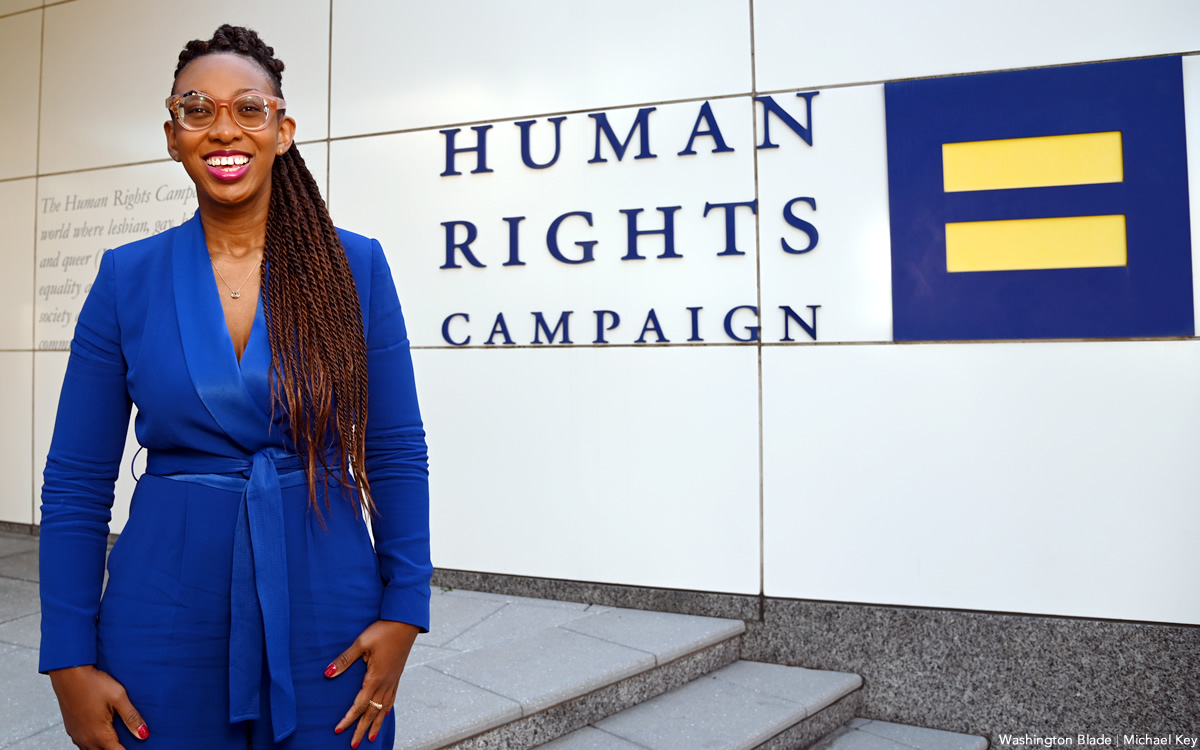
Human Rights Campaign President Kelley Robinson issued a strong rebuke on Tuesday of the Biden-Harris administration’s position opposing gender affirming surgeries for minors.
The New York Times reported on June 28 that the White House, which broadly supports making medical interventions available for transgender youth, had expressed opposition to surgeries for patients under 18, having previously declined to take a specific position on the question.
“Health care decisions for young people belong between a patient, their family, and their health care provider. Trans youth are no exception,” Robinson responded.
“The Biden administration is flat wrong on this. It’s wrong on the science and wrong on the substance. It’s also inconsistent with other steps the administration has taken to support transgender youth. The Biden administration, and every elected official, need to leave these decisions to families, doctors and patients—where they belong,” she added. “Although transgender young people make up an extremely small percentage of youth in this country, the care they receive is based on decades of clinical research and is backed by every major medical association in the U.S. representing over 1.3 million doctors.”
Robinson said the “administration has committed to fight any ban on healthcare for transgender youth and must continue this without hesitation—the entire community is watching.”
“No parent should ever be put in the position where they and their doctor agree on one course of action, supported by the overwhelming majority of medical experts, but the government forbids it,” she added.
HRC is a prominent backer of Biden’s 2024 reelection campaign, having pledged $15 million to support efforts in six battleground states. The organization has a strong relationship with the White House, with the president and first lady headlining last year’s National Dinner.
A White House spokesperson declined to respond to Robinson’s statement.
Campaign for Southern Equality President Allison Scott also issued a statement.
“This is a cowardly statement from an administration that promised to support transgender people. It is a troubling concession to the right-wing assault on transgender Americans, falling for their false narratives about surgical care and betraying a commitment to equality and trust in the medical community,” said Scott.
“Let’s be very, very clear: Government has no business inserting itself into private medical decisions that should be exclusively between patients, their providers, and the patients’ parent or guardian,” Scott added.
“It is dangerous to begin endorsing categorical bans or limits on healthcare, and there is no justification for restricting transgender youth’s access to the very same care that many cisgender youth receive every year — that’s literally the definition of discrimination,” Scott concluded. “We demand the Biden administration retract this thoughtless statement and work to undo its damage.”
Virginia
Parades, community events held to mark Pride Month in Va.
Upwards of 30,000 people attended PrideFest in Norfolk on June 22

Activists across Virginia last month held a series of events to mark Pride Month.
Hampton Roads Pride, a volunteer-run organization founded in 1997, held 37 different Pride events throughout the region in June.
Their biggest event, PrideFest, which is part of their larger three day event, Pride Weekend, celebrated its 36th anniversary on June 22. Pride Weekend took place from June 21-23 and began with a block party at NorVa in Norfolk.
PrideFest took place at Town Point Park, and an estimated 30,000 people attended. More than 70 venders participated, while Todrick Hall and Mariah Counts are among those who performed.
Another PrideFest event with a DJ in the afternoon and live music at night took place in Virginia Beach on June 23. Congressman Bobby Scott and U.S. Sen. Tim Kaine (D-Va.) are among those who attended Pride events in Suffolk on June 30.
Norfolk Mayor Kenneth Alexander, along with members of the Norfolk and Virginia Beach City Councils, also attended the Pride events in their respective cities. Jamar Walker, the first openly gay federal judge in Virginia, also took part.
“You know people all throughout Pride Month, at all of our various events, tell me all kinds of stories about their own experiences and the past of this community … and some of our older folks especially, remember when we couldn’t have this,” Hampton Roads Pride President Jeff Ryder told the Washington Blade on Monday during a telephone interview.
“It was a great year,” he added. “It was a big achievement for us to have unique celebrations in each of our seven communities. Each of these cities is so different from one another, but to be able to create a Pride celebration that’s unique in each of those places was really great, and I think really well received by folks who may not have felt represented previously. We’re always trying to do better, to embrace every aspect of our community, and take a big step forward there this year.”
State Dels. Adele McClure (D-Arlington County) and Alfonso Lopez (D-Arlington County) are among those who spoke at Arlington Pride that took place at Long Bridge Park on June 29. The Fredericksburg Pride march and festival took place the same day at Riverfront Park in Fredericksburg.
Republican Virginia Gov. Glenn Youngkin on June 10 hosted a Pride Month reception in Richmond.
Youngkin in previous years has hosted Pride Month receptions, even though Equality Virginia and other advocacy groups have criticized him for supporting anti-LGBTQ bills.
The Republican governor in March signed a bill that codified marriage equality in Virginia. Youngkin last month vetoed a measure that would have expanded the definition of bullying in the state.
U.S. Supreme Court
Concern over marriage equality in US grows two decades after first Mass. same-sex weddings
Gay and lesbian couples began to marry in Bay State in 2004

Two decades after Massachusetts became the first state to legalize same-sex marriage, a new study reveals both significant progress and ongoing challenges for married LGBTQ couples in the U.S., with a growing sense of insecurity about the future of their rights.
The Williams Institute at UCLA School of Law surveyed 484 married same-sex couples from all 50 states and D.C. The study, released Monday, marks the 20th anniversary of legal same-sex marriage in the U.S.
Researchers found that 93 percent of respondents cited love as a primary reason for marrying, with 75 percent also mentioning legal protections. Over 83 percent reported positive changes in their sense of security, and 74.6 percent noted improved life satisfaction since marrying.
However, the study also highlighted persistent discrimination and growing concerns about the future. About 11 percent of couples who had a wedding reported facing prejudice during the planning process.
Alarmingly, nearly 80 percent of respondents expressed concern about the potential overturning of the 2015 Obergefell v. Hodges decision, which legalized same-sex marriage nationwide. This anxiety has been exacerbated by initiatives like Project 2025, a conservative policy blueprint that some fear could roll back LGBTQ rights if implemented.
The possibility of a former President Donald Trump victory in the upcoming election has further intensified these concerns. Many respondents cited Trump’s previous U.S. Supreme Court appointments and his statements on LGBTQ issues as reasons for their apprehension. One participant stated, “The thought of another Trump presidency keeps me up at night. We’ve come so far, but it feels like our rights could be stripped away at any moment.”
The current political climate has 29 percent of respondents considering moving to another state, with 52.9 percent citing socio-political concerns as a primary reason. This reflects a growing sense of insecurity among LGBTQ couples about their rights and freedoms.
Brad Sears, founding executive director of the Williams Institute, noted, “The data clearly show that marriage equality has had a profound positive impact on same-sex couples and their families. However, it also reveals ongoing challenges and serious concerns about the future of these rights in light of current political trends and the upcoming election.”
Christy Mallory, legal director at the Williams Institute and lead author of the study, added, “This research provides crucial insights into the lived experiences of same-sex couples two decades after marriage equality began in the U.S. The high level of concern about potential loss of rights underscores the continued importance of legal protections and public support for LGBTQ+ equality.”
The study found that 30 percent of surveyed couples have children, with 58.1 percent of those parents reporting that marriage provided more stability for their families. However, many of these families now worry about the security of their legal status in the face of potential policy changes and shifting political landscapes.
As the nation reflects on two decades of marriage equality, the study underscores both the transformative power of legal recognition and the ongoing need for vigilance in protecting LGBTQ+ rights. The findings highlight the complex reality faced by same-sex couples in America today: Celebrating hard-won progress while grappling with uncertainty about the future, particularly in light of upcoming political events and potential shifts in leadership.
-

 Canada1 day ago
Canada1 day agoToronto Pride parade cancelled after pro-Palestinian protesters disrupt it
-

 Theater4 days ago
Theater4 days agoStephen Mark Lukas makes sublime turn in ‘Funny Girl’
-

 Baltimore3 days ago
Baltimore3 days agoDespite record crowds, Baltimore Pride’s LGBTQ critics say organizers dropped the ball
-

 Sports4 days ago
Sports4 days agoHaters troll official Olympics Instagram for celebrating gay athlete and boyfriend

